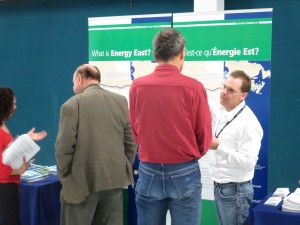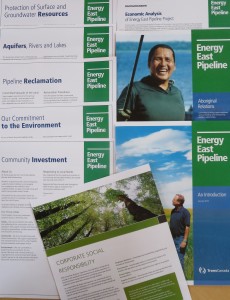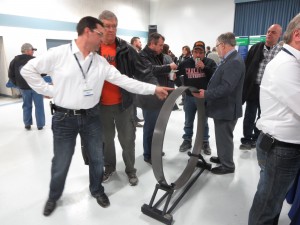Take your pick: rail, pipeline, both – or none of the above

TransCanada presents their case for Energy East at this informational session in North Gower, Ontario. Photo: Lucy Martin
It’s become pretty clear that shipping oil by rail raises serious issues. That might make the case for pipelines seem more attractive, but nothing’s ever simple, is it? We’re still left with questions about pipeline safety. Plus the still-larger debate about climate change and if we are doing enough to move away from carbon energy, period.
Within that big picture come many specific projects, such as Canada’s oil sands, the Keystone XL pipeline project, and something called Energy East, which would move oil sand bitumen from Alberta to Canada’s Atlantic seaways and shores.
The company behind that proposal, TransCanada, brought its Q&A road show to my village of North Gower, Ontario this past Thursday, with a 4 -8 pm event designed to accommodate most schedules. Here’s a generally-favorable report on that from the Ottawa Citizen:
Many, if not most, of the several hundred people who attended an “outreach” meeting Thursday evening on TransCanada Pipelines’s Energy East oil pipeline left the session impressed with the company and less concerned about the pipeline’s safety than they had been.
And more from the CBC:
Ben Powless, of Ecology Ottawa, said he is becoming more resolute in his opposition to the project as the months go by. He said he has less faith in the company’s safety record since a recent National Energy Board audit, and doesn’t necessarily believe what the company says.
His key concern is the possibility of an oil leak into the Ottawa River.
“If it got into there, that’s basically the drinking water supply for everybody who lives in the city,” said Powless. “The Rideau River also supplies a lot of sources of groundwater.”
TransCanada spends one billion dollars a year on its pipeline safety program, said company spokesperson [Philippe] Cannon, who adds that pipelines are the safest way to move large quantities of oil.
He adds that the company takes special measures in its pipelines near important waterways.
I attended as an area resident.

Few in number, but passionate in their cause, this group came to offer a different view. Photo: Lucy Martin
A handful of extremely well-mannered protesters hosted their own information table and a petition of opposition outside the municipal arena.
Inside, TransCanada had a small army of equally polite, attentive, well-trained and articulate representatives tending different explanatory stations. (My tally was at least 30 working the floor, not counting greeters or TransCanada executives in civilian clothing.)
Still photos were allowed but signs at the door stated that video or audio recording was prohibited unless being conducted by authorized news media. Did that mean only pre-cleared news media would be allowed inside to report? Or was it some “no amateurs allowed” position? (As in “real” reporters only, no bloggers or citizen journalists?) I could have asked and found out. Higher officials from TransCanada were there and I am sure they would have happily spoken on record. But I chose to just observe and not out myself.
All the TransCanada representatives I encountered emoted friendly sincerity and were carefully non-confrontational. Sort of “We know you have valid questions and we’re here to help!” While there I ran into one pro-project friend and a skeptical acquaintance, who thinks we’ve pushed the planet too far and much more needs to be done to move away from oil.

Sample of background handouts at the TransCanada Energy East informational presentation. Photo: Lucy Martin
We spent time discussing the route as a land issue with an extremely personable TransCanada representative from Calgary. (The team of presenters takes their show on the road as needed, and expects they may be doing it again in other locations this fall.)
The displays were high quality. Stacks of informational fliers were available, in both official languages. There were some give-away items (carabiner lanyards and tote bags) and a pretty nice spread of finger food. Let’s just say money didn’t seem to be an issue. Without arguing if the claims are true, false, or something in between, the whole presentation represents a massive display of intense public relations with every nuance skillful marketing can provide.
So here’s a negative take on that project, as presented in early March by Heather Smith of Grist, an environmental publication, “Big Oil’s new strategy: if you can’t build a new pipeline, just overload the old one“. The title is pretty self-explanatory, with criticism of what Smith calls:
“…part of a hot, new trend in trans-national pipe dreams: Skirting environmental review, and public scrutiny, by pumping dirty crude through existing pipelines rather than building new ones.”
One can argue day and night about these issues. If a well-funded corporate road show counts as public consultation. About the safety record of TransCanada, or the wisdom of this specific proposal. But I was struck by something my pro-project friend said “We need more pipelines.” (The TransCanada rep seemed stunned and simply replied “Well, that’s not something I hear very often.”)
For the sake of argument, let’s say that the whole world should get off carbon fuels and switch to green, renewable resources. How fast does anyone expect that can happen? What are we going to do between now and that utopian end goal, keep shipping oil by rail?
For the purpose of this post, I’m thinking out loud about what we often call infrastructure.
It’s not hard to think of water systems, sewer systems, roads, bridges and yes, pipelines that are aging out. Many stand in great need of repairs or outright replacement. If one looks at pipelines in that category – as basic infrastructure we still use and will continue to need for some foreseeable future – is there a good case for supporting re-purposed pipelines? New pipelines?
Of course, the pro-oil camp considers this obvious: North America uses energy and may need more ways to deliver it.
But what does the environmental crowd think? Can we really move away from carbon fast enough to not need any more pipelines? I’m not criticizing, I’m asking.
This was the vista on the western skyline as I left the meeting. It’s a beautiful world. What’s the best way to live in it without causing too much damage?
Tags: economy, energy, environment, North Gower, Ontario, pipeline safety, rail safety, TransCanada, transportation










Just to start a debate, I’ll take an underground pipeline any day over an above ground wind turbine. And let’s not forget, most people people will chose the cheapest and most convenient energy possible over one costing more.
And to add to the mix, I don’t want any propane going to the Ukraine, driving up the cost here.
So much for actual debate.
I’m not in favor of creating new pipelines. I hear some say that the oil will flow whether we build the pipelines or not. I also see the big oil guys greedily taking huge profits and resisting spending any on new rail cars or even upgrades of existing rolling stock. These are not the people I’d like to depend on for energy. Trust is simply not there. I tell it to people this way, These guys are raping Canada. Take a look, there’s no better way to describe it. They say that the rape will continue whether the pipeline is built or not, so how about some for us? To me it doesn’t matter if that makes us an accessory or a party to the rape. I’m not interested.
Well there are so many issues involved.
The way to stop the destruction of the environment in Northern Alberta is pretty simple, the Canadian government could regulate it out of business, just make it illegal to do that sort of extraction. Strip mining in the US wen through that sort of a process. Stopping a pipeline does not get at the issue a pipeline is just one means of transportation, the problem is the extraction itself.
In general pipelines are more efficient than rail or truck and they would use less carbon to transport oil or gas. However, I do think there are pretty large environmental risks from a pipeline.
The basic issue is that the entire world runs on fossil fuels. There is no developed country in the world that does not depend on fossil fuels or nuclear energy. The demand is growing not decreasing.
People complain about these companies, but see how much more they complain when there gas or electric bills go up or when there is a disaster and the lights and heat go out.
Hi technology runs on fossil fuel. Just try unplugging your computer from the wall and see how far you get.
Trouble is, Mervel, everything that we do to make fossil fuel cheaper postpones the day that renewable energy will finally replace it. If the government would just get solidly behind renewables, there’s still a slim chance that we could end up creating U.S. jobs building the new technology. If we allow the Koch brothers to suppress interest in renewable energy, we’ll end up buying the technology from China when the time comes, as come it must.
Yeah right, blame it all on the Koch brothers, that’s easier than having an original thought. Are the Koch brothers driving all those SUVs up ad down the Northway?
No, Larry, the Koch brothers aren’t personally using up all the oil. But they are producing a bunch of it, and they are at the forefront of climate change denial.
It’s always easier to have a bogeyman to blame things on than it is to live up to one’s own rhetoric. The Kochs are today’s whipping boys; nothing more than the latest in a line stretching back through the Rockefellers to J P Morgan, et al. Will anyone give up their gas-sucking SUV or the sneakers made by under-paid and child labor? How about all the electronic devices manufactured in countries that make the US look like a green operation? I doubt it; rhetoric is always easier than action.
Larry, I agree entirely that we should all be driving less wasteful cars, and living in smaller houses. But that doesn’t invalidate the fact that the Koch brothers are single-handedly (er, double-handedly?) heavily funding climate change denial.
For the record, I drive a 16-year-old Civic (w/o AC), live in a 1000 square foot house (w/o AC) and don’t have a TV– my only electronic device of note is my laptop. I would be happy to buy American-made sneakers if I could find any. Does that mean I can complain about the Koches all I want?
Walker, driving an old car and eschewing television doesn’t give one license to repeat cliches. If that’s all you want to do, I guess there’s no stopping you, but it won’t advance the debate on substantive grounds. My point is that there is much more to this issue than blaming the bogeyman du jour.
It also doesn’t advance the debate to dismiss the Koch brothers as the “bogeyman du jour.” There’s more to their actions than that.